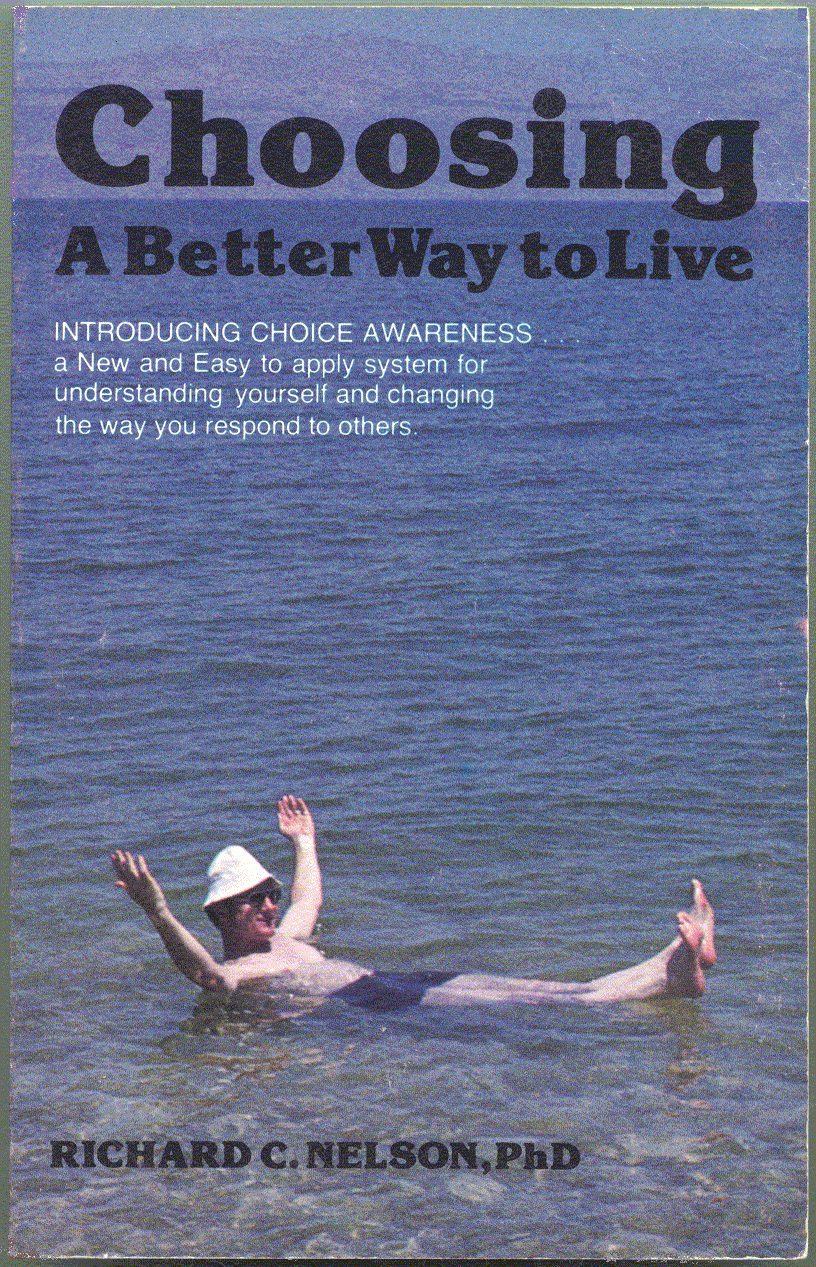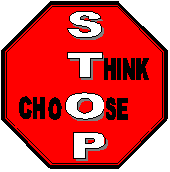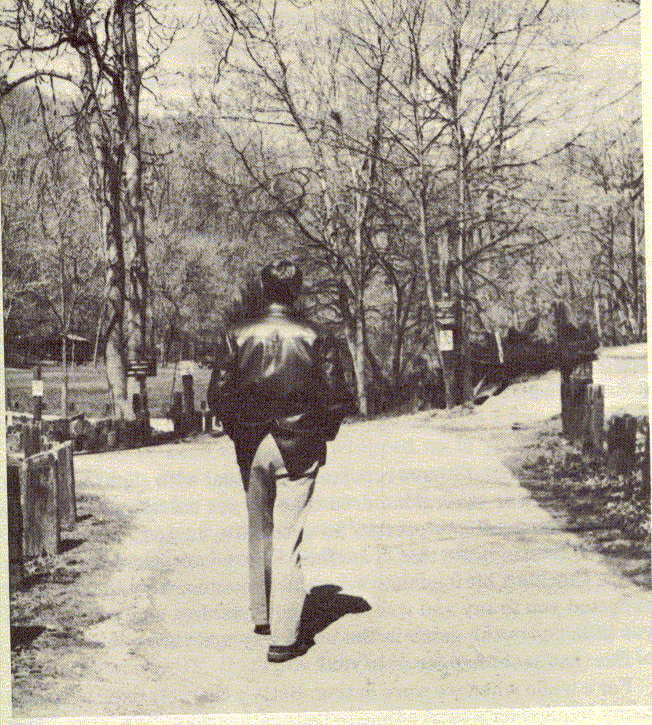|
Dick Nelson's |
Ordering Information | List
of Publications | Seminars | Choices, Choices: A Tryout Activity
and "Ungame"

CHOOSING A
BETTER WAY TO LIVE offers a view of choice-making that is highly personalized.
CHOOSING makes it clear that we are all making choices continuously, and that
we can vary the pattern of choices significantly from the ways in which we have
chosen to talk and act, and even think and feel, in the past. When we
understand how we might change our patterns of choices, we find we are able to
change our relationships and our view of ourselves.
CHOOSING A
BETTER WAY TO LIVE dates back to the mid-1970s, and thus is offered as a
premium for many orders -- but its messages are still current and valuable.
Below
is a partial
text of Chapter 3.
|
Chapter 3 -- I HAVE AN
INSTANT TO CHOOSE |
|
You greet me with: Good morning. Hello how are you? I ask. Fine, thank you, and you? you reply. Just great, thanks, is my rejoinder. Glad to hear it. Tell Betty hello. Surely will. Be seeing you. Bye. |
|
Perhaps you and I have repeated this ritual with
slight variation several dozen or several hundred times in our occasional
meetings. It now seems quite automatic. So automatic, in fact, that I might now
and then indicate that "I am fine" before I am asked. Each of us
might chuckle a bit in embarrassment. I, because I acted on what I expected you
to say and was caught not listening, and you because you didn't play the game
in the usual way and threw me off.
Has that never happened to you?
For a while when we were dating, Betty's
characteristic response to my request for a future time to be together was,
"We'll see." Her response seemed to be very automatic. Perhaps at
times she knew she had conflicts and at other times that she would be glad to
go. Likely it meant, "I have to reflect a moment." In any case the
regularity of the response became a source of amusement for both of us.
Circumstances bombard all of us that seem to call
for specific responses. We are walking toward a door and my arms are full; you
open it for me. A child is alone and crying; I go to see what I can do. You
hear me call, "Hey, wait a minute;" and you slow your pace so that I
can join you. I arrive in a parking space a moment after you; I wait for your
passenger to get out before opening my door. Three of us are standing in front
of a busy clerk and I know I arrived after you; I wave you ahead of me. I lean
toward you and offer you a stick of gum; you accept it, smiling.
One person makes a move, the other responds. In
psychological terms, one of us provides a stimulus and the other makes a
response. That's just the way it is.
Or is it?
Do I always stop for a crying child? I might like
to say yes, but I won't. It isn't true. Sometimes I don't feel that I can
afford the time. Sometimes I "assign" the responsibility to another
adult; that is, I assume that another adult will (or should) take action.
Sometimes I make eye contact with the child, move toward him or her, and am
told nonverbally to stay away through louder crying or through a back-pedaling
movement. Sometimes I might be fearful of the circumstances. Could it be a
trap? This is the big city. Maybe it's like the dropped wallet trick. I'd best
go on. And I do.
Maybe you've been so busy or wrapped up in your
thoughts at times that you didn't even hear when someone called to you and
said, "Hey, wait for me." You can't always stop; there are other
demands that press harder on you than to respond to someone in the hall or
walking down the street. That other person may be feeling bad because you waved
and went right on "as if you didn't hear me ask you to wait."
It would be easy for you -- or someone else -- to
assume that the other person was OK. He or she didn't appear to be hurting --
or to need you.
I remember one time when I really was feeling
lonely. I'd had a great time at a convention a few days previous and as often
happens when I have a really close experience I felt a void in my gut a bit
later. I called to a friend whom I hoped might fill that void. The friend waved
and went right on.
The point is that we can be, and are, important to
one another.
That friend and I had no history of my asking for
time because I needed it. How could he know I needed him then? Anyway, now I'm trying
to get closer to my feelings and to recognize and deal with them -- whatever
they are. I'm more likely now to call to a friend.
Neither you nor I always do what we
"always" do.
Confusing? I simply mean that each of us on
occasion acts differently than we might be predicted to act. I even act in ways
that are different than I would predict for myself.
Between the time I take in the full implications of
a situation and come out with the words and actions that you see, I have made a
choice. I am not a computer and, though my response may seem automatic, what
you see is my choice.
You say good morning and smile. Most of the time I
do the same. Must I? Is my reaction really automatic?
Suppose you and I had a big argument yesterday.
Might I say something different and withhold my smile? Try me.
Suppose I'm really feeling bad about something that
has nothing to do with you? Am I still locked into a morning smile? Guess
again.
What if I have missed you for some time and I
really am glad to see you. Could I forego the usual pleasantries and greet you
far more enthusiastically? Could I put my hand on your shoulder or hug you and
say: It's really good to see you? Perhaps. My habits may be strong and well
ingrained, but since I can do otherwise in the moment they are not truly
automatic.
|
In most circumstances there is available a brief instant
which we may use as we have in the past, or we may use it to make new choices. |
I appreciate many of my habits since they make life
easier. I don't have to decide where my mouth is to convey a spoonful of cereal
to it. I don't have to debate about which side of the street to drive on. I
don't have to consider whether or not to wear underwear, trousers, or a shirt.
I don't need to choose every word with care and can let pure unadulterated
habit have sway at times.
It's really great to have some relationships that I
can leave alone. I don't need to "push the river" all the time. But I
do appreciate knowing that I can take that split second and make something different
happen. I especially like knowing that a relationship I want to be different
can be influenced by my choices. I have been dimly aware of that in the past.
Now I know it more clearly.
It's the same for you. . .
In our anxiety about the risks of new choices we
often forget that there are risks either way. Not risking in a relationship may
mean that it continues on a downhill course. Often the negative consequences
are less than we fear. We need to weigh benefits against risks -- and consider
what will be more meaningful in the relationship. .
.
. . . I am impressed by how little
energy we each seem to exert in ways which thrust back the limits of a
relationship just a jot further, reaching out to arrive at some new place where
we have not really been before.
Responders. Creatures of habit. Security-seekers.
We don't have to choose in those ways.
|
Our habits reduce risks but risk-taking can lead to greater
meaning in our lives.
|
Maybe you wonder how I know there really is a split
second, a moment, in which to choose. Or whether it is really in my power, in
your power, to choose differently than before. Habit is a strong force.
One portion of T. S. Eliot's "The Hollow
Men" suggests "Between the emotion / and the response / Falls the
shadow / Life is very long." I like to think of the shadow as habit, and
the light which could be there as the decision which would be made if you, if
I, dared to make it.
Think of it this way. Good readers can learn to
read upwards of 2500 words per minute. Faced with a chance to choose, it is
possible that our minds can function at a rate twice that in concepts,
unfinished sentences, and messages that tell us how we are feeling. Perhaps the
statement: My mind went blank, really means: I had so many confusing and
competing ideas and feelings that I didn't know what to do.
In my work of preparing counselors, when the
picture on videotape monitor hashas
shown the child turning away, for example, I have asked several questions of
the counselor who was watching the playback with me. What was the child
thinking, what was the child trying to accomplish, what were the feelings the
child had, what did that behavior mean to the counselor, and what did the
counselor want to accomplish. I have gotten good answers to all of those
questions. I have further asked what awareness the counselor had of those
matters in the moment and found that many times the counselor felt aware of all
of those factors. This person may have been dealing with six, eight, ten or
more ideas at one moment. You and I do the same.
Between your movement (stimulus) and my behavior
(response) I make a choice. If I follow my habit I may believe I have not made
a choice. If I make an active decision I will have a greater sense of my own
choosing. In both cases, however, I have chosen. There is a popular poster
which says "Not to decide is to decide;" let's paraphrase it: Not to
choose is to choose.
|
Following habit gives us little sense of our own power; |
Wait a minute, you may well ask, where is the
spontaneity in all this? If I don't do what my impulse says, isn't my behavior
non-spontaneous?
Good question.
I used to worry about that a lot myself. If I plan
ahead, do I become calculating and manipulating?
Is that moral? Is it fair?
Is there a good middle ground between being
helplessly tied to habit -- a position which is lacking in spontaneity although
it may appear otherwise, and being calculating and manipulative -- a position
which also lacks spontaneity?
My observation of the world as it exists is that I
don't see much evidence of spontaneity. I don't even see very much in my own
behavior. What passes for spontaneity is often quick, habitual responding. The
same old put-down is delivered in language that is brand new.
If you and I are to be more spontaneous with
others, I believe that we will each have to learn and practice a wider
repertoire of behaviors. Ultimately we will become effective in making a
broader range of responses. When we have a broad range of options within which
we are reasonably comfortable, we can then function more spontaneously. And
when we make different and more spontaneous choices we open the door to
different and more spontaneous choices of others.
In my use of the instant, in my choice for habit or
for a decision, I value spontaneity. I also value meeting my needs and the
needs of the other; I value effectiveness. As you and I explore our choices, we
may find that our reaction time is slowed just a bit while we consider our
alternatives and make more functional selections. If we come to use that
instant well, the split second of hesitation is a small price to pay.
|
The cost of making better choices may be the loss of a split
second. |
You, as I, have the opportunity to exercise the
split second that is available in new ways, as opposed to acting on habit.
Perhaps you too spend more energy in maintaining the status quo than in
venturing into new avenues in your relationships. You can change such patterns.
Explore the dozens of relationships you have --
those that are deep and those that are superficial. In which ones do you risk
new choices, making attempts at finding new directions? Do you find as I that
spontaneity hasn't had much of a part in your life? If you're feeling
frustrated after answering such questions let me suggest that satisfaction has
to go before change comes. Perhaps I should help make the load lighter, though,
by suggesting that it may be well to focus on just one or two relationships in
which you see the need for change -- for the time being think about those
relationships as you explore ways in which you may make better choices.
|
In order to use our instant more effectively, we need to
practice new choices. |
|
INCREASING AWARENESS |
In the full text, tThe
section with the above title contains a number of suggestions the reader may wish
to carry out under three headings: BY YOURSELF, WITH A PARTNER, IN A GROUP.
Each of the activities is designed to emphasize the idea that we have an
instant to choose, and we can use that instant in a great variety of ways.
Example: Under BY YOURSELF the third paragraph
states: Before you go on to the next paragraph, right now, take an instant and
make a choice. Pick up the telephone or speak to someone in person, indicating
that person's good effect on you. Take the instant you have and make an outreach
to another at least twice between now and your next reading.
![]()
Stop
Think Choose Homepage | Choices, Choices: A Tryout Activity
and "Ungame"
Ordering Information | List of Publications
This site created and maintained by Dick Nelson; Last update August 16, 2010June
9, 2010

